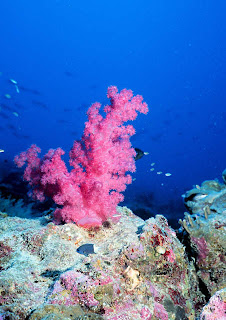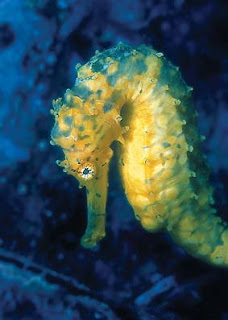

It was long believed that corals need warm,well-lit tropical waters to live been recently some white corals have
been discovered in cold deep waters where there is also no light .Some of these temperate corals are 30 feet tall.They seems as abundant as the tropical corals but they have not been explored as much.
HOME and HIDING PLACE
Tropical corals reefs are found around the Equator about 30degeernorth and south.They are the best known among the corals.They need clear water,warmth and light and are found near the coast line.Although the chief architects of the huge reefs are the stony corals,not all corals are hard.Some corals are known as soft corals and these don't have the rigid outer skeleton we associate with hard corals.
There are different types of corals reefs the Fringing reed,the Barrier reef and the Atoll.Fringing reefs are found off the shores of islands the Barrier reef from the shore.Probably the best known Barrier reef is The Great Barrier Reef off the coasts of Australia.It is 1,269 miles long and from 10 to 90 miles wide. An Atoll is an isolated ring of coral.It is formed when an underwater volcano erupt and the lava rises above the surface of the sea.
Thousands of plants,fishes and invertebrates such as sponges ,sea cucumbers,sea squirts and clams live in the tropical coral reefs.The Great Barrier Reef contains some 3000spieces of animals.
The reef provides a home to some animals and as place to hide for others.It also serves as a dining table for predators such as sharks which come to forage on animals congregating in coral reefs.There are,of course,animals that eat the reef itself.
Some fish that are found in the open sea use the reef as a place to gather and breed.A few use the reef as a types of spa!
The Wrasse is a fish that gets its food while cleaning other sea creatures.Wrasses eat the parasites and debris on the bodies of other creatures.
Unfortunately,as a result of changing climate,increased pollution and other factors,the world's coral reefs are now threatened habitats.
Welcome
We Know,What U think!!
Readers to my blog
Labels
- 18 has came (3)
- Alcohol (1)
- amphibians (1)
- animals (3)
- bikes (4)
- birds (3)
- cancer (1)
- Cars (8)
- cartoon (2)
- corals (1)
- dancer (2)
- disease (2)
- dish (6)
- election (2)
- entertainment (6)
- environment (9)
- feel it (6)
- flowers (2)
- food (6)
- games (3)
- general (33)
- harmfull (2)
- health (13)
- insects (1)
- likes (12)
- Love (4)
- love him (4)
- magic (6)
- media (7)
- Michael jackson (2)
- MJ (2)
- Money (1)
- mystery (7)
- nature (15)
- new (11)
- offence (1)
- organisms (1)
- phones (8)
- Pop (1)
- Predators (1)
- quick TIP (25)
- Recipe (8)
- relationship (1)
- resort (1)
- Rest In Peace (2)
- RIP (4)
- skill (5)
- Space (5)
- sports (2)
- Technology (5)
- The Inventor (3)
- things to remember (36)
- things we use (14)
- thrills (8)
- Toys (1)
- tree (2)
- True (7)
- try urself (15)
- voting power (2)
- watch (2)
- wishes (8)
Followers
Recent post
Labels:
corals
Subscribe to:
Post Comments (Atom)
0 comments:
Post a Comment